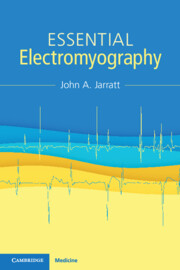Book contents
- Essential Electromyography
- Essential Electromyography
- Copyright page
- Dedication
- Contents
- Figures
- Diagrams
- Tables
- Preface
- Acknowledgements
- Abbreviations
- Chapter 1 Introduction
- Chapter 2 Basic Anatomy and a Little Physiology
- Chapter 3 Peripheral Nerve Types
- Chapter 4 Peripheral Nerve Function
- Chapter 5 The Neuromuscular Junction
- Chapter 6 Muscle
- Chapter 7 Some Technical Matters: Electrodes, Stimulators, Amplifiers, Display, Averagers
- Chapter 8 Volume Conduction
- Chapter 9 Pathology
- Chapter 10 Electromyography (EMG)
- Chapter 11 Nerve Conduction Studies (NCS): Introduction
- Chapter 12 Nerve Conduction Studies: Normal
- Chapter 13 Nerve Conduction Studies: Degeneration
- Chapter 14 Nerve Conduction Studies: Demyelination
- Chapter 15 Degree of Pathology
- Chapter 16 Tests of Neuromuscular Transmission
- Chapter 17 Other Techniques: F-waves and H-reflexes
- Chapter 18 Clinical Applications
- Chapter 19 Other Stuff: Aberrant Nerve Pathways, A-waves, EMG Anomalies
- Chapter 20 Normal Values
- Chapter 21 Conclusion
- Glossary
- Further Reading
- Index
Chapter 15 - Degree of Pathology
Published online by Cambridge University Press: 14 September 2023
- Essential Electromyography
- Essential Electromyography
- Copyright page
- Dedication
- Contents
- Figures
- Diagrams
- Tables
- Preface
- Acknowledgements
- Abbreviations
- Chapter 1 Introduction
- Chapter 2 Basic Anatomy and a Little Physiology
- Chapter 3 Peripheral Nerve Types
- Chapter 4 Peripheral Nerve Function
- Chapter 5 The Neuromuscular Junction
- Chapter 6 Muscle
- Chapter 7 Some Technical Matters: Electrodes, Stimulators, Amplifiers, Display, Averagers
- Chapter 8 Volume Conduction
- Chapter 9 Pathology
- Chapter 10 Electromyography (EMG)
- Chapter 11 Nerve Conduction Studies (NCS): Introduction
- Chapter 12 Nerve Conduction Studies: Normal
- Chapter 13 Nerve Conduction Studies: Degeneration
- Chapter 14 Nerve Conduction Studies: Demyelination
- Chapter 15 Degree of Pathology
- Chapter 16 Tests of Neuromuscular Transmission
- Chapter 17 Other Techniques: F-waves and H-reflexes
- Chapter 18 Clinical Applications
- Chapter 19 Other Stuff: Aberrant Nerve Pathways, A-waves, EMG Anomalies
- Chapter 20 Normal Values
- Chapter 21 Conclusion
- Glossary
- Further Reading
- Index
Summary
Slowed conduction in a demyelinated nerve is proportional to the degree of pathology. More severe pathology leads to conduction block and ultimately to degeneration of the nerve. Degeneration causes the amplitudes of the action potentials, sensory nerve action potentials (SNAPs) or compound muscle action potentials (CMAPs), to be reduced. Unfortunately, the positively skewed distribution of these severely limits their clinical usefulness in assessing the degree of pathology. The demonstration of unstable nascent potentials can be a useful sign that motor nerve regeneration is occurring but, in general, the contribution of electrophysiological techniques to the monitoring of peripheral nerve degeneration is disappointing.
Keywords
- Type
- Chapter
- Information
- Essential Electromyography , pp. 68 - 71Publisher: Cambridge University PressPrint publication year: 2023

